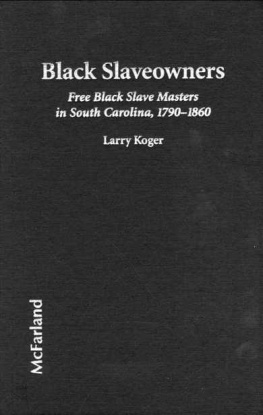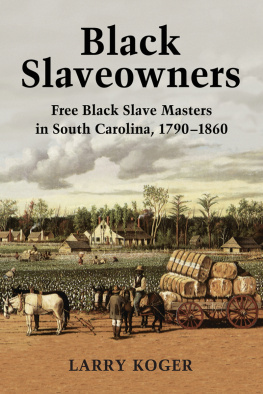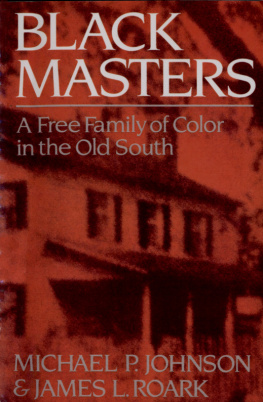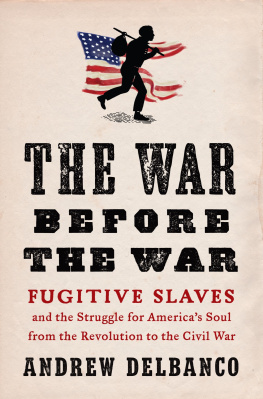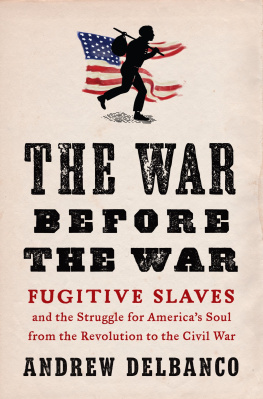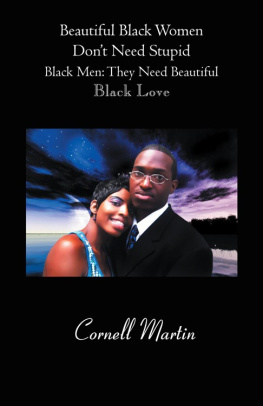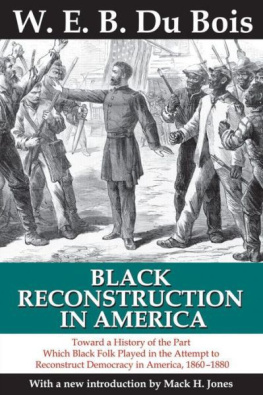



To my parents and Rhudine Johnson
Historical research is often stimulated by a provocative question; such was the case for me. As a bright-eyed undergraduate at the University of the District of Columbia, I was exasperated by a multitude of questions resulting from my discovery that free Afro-Americans owned slaves. Who were these black masters, and why did they acquire slaves? Under the guidance of Dr. David Lewis, I attempted to unravel the mystery. It was in Professor Lewis' seminar course that my first inquiries were made and subsequently answered in the paper, "Free Blacks as Slaveowners in America, 1650-1850." Without the initial inspiration provided by Dr. Lewis, this book would have been impossible.
Indeed, the seminar taught by Professor Lewis prompted an investigation which lasted five years. It was at Howard University that I improved my methods and asked more sophisticated questions. I am deeply indebted to Professor Thomas J. Davis, who read my graduate papers on the black slaveowners of South Carolina, and Martha S. Putney, who read the chapter "No More Black Massa." Their insights were extremely beneficial. In addition, a word of thanks must go to Walter Hill, a graduate student at Maryland University. Walter led me to make the connection linking the African-born slavers in Guinea and Sierra Leone with the free black masters of South Carolina.
I am also appreciative of the assistance and cooperation provided by the staffs of the Library of Congress, Manuscript Division; the National Archives, Genealogy and Manuscript Divisions; the Department of Archives & History, Columbia, South Carolina; the South Caroliniana Library, University of South Carolina; the South Carolina Historical Society, Charleston; Robert Small Library, College of Charleston; and the Moorland-Spingarn Research Center, Howard University.
Finally, I am especially grateful to my aunt, Rhudine Johnson, who provided me with lodging and conversation during three summers of research in Columbia, South Carolina. Without her support, my investigation would have been intolerable.
Larry Koger
Washington, D. C.
August 31, 1985
vii
xi
xiii
Chapter 5
Chapter 18
Chapter 31
Chapter 45
Chapter 69
Chapter 80
Chapter 102
Chapter 140
Chapter 160
Chapter 187
1.1. Percentage of Free Black Slaveowners and Slaveholding Heads of Family Recorded on the Federal Censuses with State and Local Records Demonstrating Slaveownership in Charleston City, South Carolina, 1830-1860 9
2.1. Number of Free Black Slaveowners and Slaveholding Heads of Family in South Carolina, 1790-1860 20
2.2. Number of Slaves Held by Free Black Slaveowners and Slaveholding Heads of Family in South Carolina, 1790-1860 21
2.3. Percentage of South Carolina Free Black Slaveowners and Slaveholding Heads of Household Residing in Charleston City, 1790-1860 22
2.4. Percentage of Female Black Slaveowners and Heads of Slaveholding Households in Charleston City, South Carolina, 1820-1864 24
2.5. Age and Sex Distribution of the Slaves Held by Free Blacks in Charleston City, South Carolina, 1850 26
2.6. Age and Sex Distribution of Slaves Held by Free Blacks in the Rural Counties of South Carolina, 1850 28
7.1. Profits, Losses, and Returns for the Santee Plantation in Georgetown County, South Carolina, 1849 123
7.2. Profits, Losses, and Returns for Robert Michael Collins' Plantation in Georgetown County, South Carolina, 1859 125
7.3. Production Figures for the Ellison Plantation in Sumter County, South Carolina, 1849-1861 137
In South Carolina, free Negro masters were similar to white slaveowners. Both exploited the labor of slaves with the desire for profits. Quite often, the colored artisans bought slaves who were employed in their trades. Others bought slaves to be hired out and then kept the wages of their bondsmen. They also established a master-slave relationship which demanded subservience from their slaves. The documents I have examined showed Negro masters selling rebellious slaves or placing disobedient bondsmen in the local jail or the workhouse.
Yet black slaveholding had a benevolent side. Black folk labored for years to purchase the freedom of family members who were slaves to white masters. Still others acquired the freedom of beloved friends.
The survey of the local documents could not demonstrate the dominance of the benevolent or kinship aspect of black slaveowning. Indeed, the census of 1850 demonstrated that 83.1 percent of the Negro masters were mulattoes, while nearly 90 percent of their slaves were of dark skin. Where was the kinship? Since mulattoes primarily married mulattoes, the black folk owned by light-skinned Afro-Americans were seldom kin and were overwhelmingly held as laborers. By and large, Negro slaveowners were darker copies of their white counterparts.

Black slaveholding is a historical phenomenon which has not been fully explored by scholars. Graduate students of history are often surprised to learn that some free blacks owned slaves. Even historians are frequently skeptical until they discover the number of black masters and the number of slaves owned by them. To many readers, slavery was an institution exclusively utilized by white slaveowners. The fact that free blacks owned slaves has been lost in the annals of history.
Yet at one time or another, free black slaveowners resided in every Southern state which countenanced slavery and even in Northern states. In Louisiana, Maryland, South Carolina, and Virginia, free blacks owned more than 10,000 slaves, according to the federal census of 1830.'
Many of the black masters in the lower South were large planters who owned scores of slaves and planted large quantities of cotton, rice, and sugar cane. In 1860, for example, Auguste Donatto, a free colored planter of St. Landry Parish in Louisiana, owned 70 slaves who worked 500 acres of land and produced 100 bales of cotton. About 600 miles to the east of Louisiana in the county of Sumter, South Carolina, William Ellison, a free colored planter, used the labor of 70 slaves to cultivate 100 bales of cotton in 1861. In South Carolina, Robert Michael Collins and Margaret Mitchell Harris used their slaves to till the soil of Santee Plantation and grew 240,000 pounds of rice in 1849. But the majority of the large colored planters lived in Louisiana and planted sugar cane.2 In 1860, Madame Ciprien Ricard and her son Pierre Ricard, free mulattoes of Ibeville Parish, owned 168 slaves. The joint operation of mother and son used the labor of slaves to produce 515 hogsheads of sugar in 1859. Yet not all of the black masters were planters or from the South. In fact, the city of New York had eight black slaveowners who owned 17 slaves in 1830.3 In short, the institution of black slaveowning was widespread, stretching as far north as New York and as far south as Florida, extending westward into Kentucky, Mississippi, Louisiana, and Missouri.

